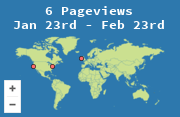South African primary schools were placed 132th out of 144 countries with regard to quality teaching, and 115th with regard to access by children to these schools. This is the findings of the recent World Economic Forum (WEF) Global Competitiveness Report 2012/2013.
A positive point however was that South Africa’s Higher Education and Training sector as a whole was placed at 84th position. This could be because South Africa has a number of world-class universties, according to Graeme Bloch, an independent Education expert.
With regards to the quality of mathematics and science education South Africa was placed second last.
Countries with the best primary education according to the report is Belgium, Finland, New Zealand, Singapore, Netherlands, Iceland and Canada.
To read more go to Alet Rademeyer’s article in the Afrikaans newspaper Beeld by Clicking Here!
To read the WEF Global Competitiveness Report 2012/2013, Click Here!
Filed under: Edu News (South Africa), Reports, Schools, South Africa, Statistics | Tagged: access, Education, Global Competitiveness Report, primary schools, quality, ranking, South Africa, WEF, World Economic Forum | Comments Off on South African schools fared poorly in WEF Report









You must be logged in to post a comment.